Key takeaways:
- Resilience is crucial for overcoming setbacks and achieving success.
- Effective communication and active listening strengthen relationships and foster collaboration.
- Time management enhances productivity and quality of life, reducing stress.
- Embracing lifelong learning opens doors to personal and professional growth through new experiences.
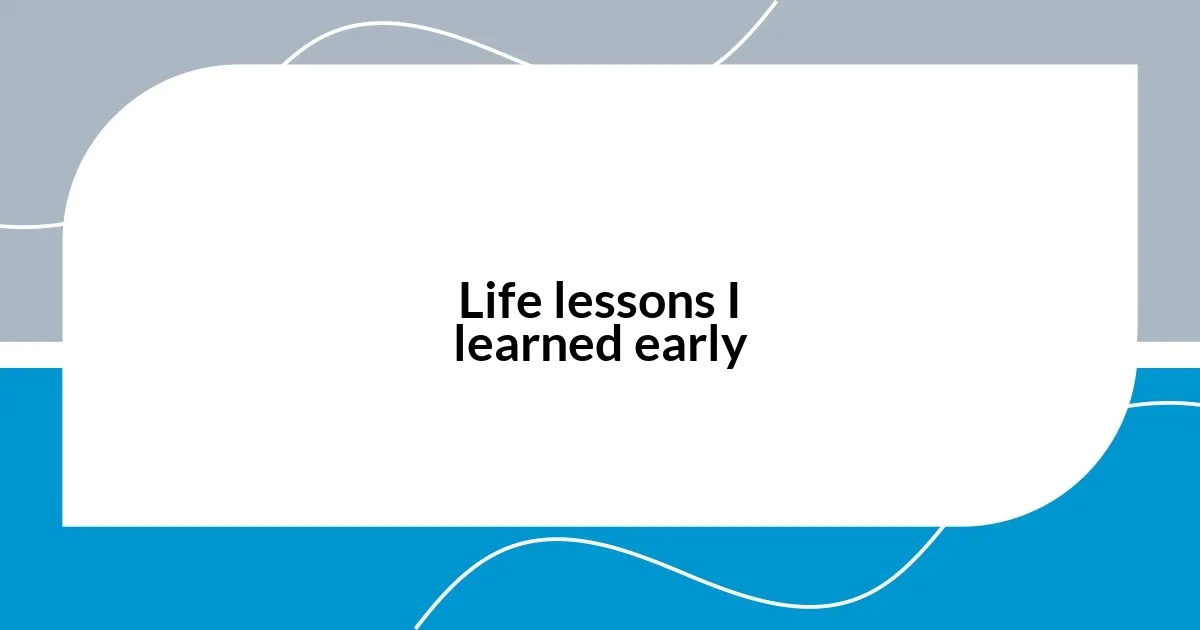
Life lessons I learned early
One of the earliest lessons I learned was the importance of resilience. I remember a time in my childhood when I faced disappointment after losing a key soccer game. Instead of wallowing in my defeat, I found strength in the determination to practice harder, and that experience taught me that setbacks are often just stepping stones to success. Isn’t it fascinating how resilience shapes our lives in ways we don’t realize until much later?
Another poignant lesson came from a summer job I took at a local café. I was initially overwhelmed by the fast-paced environment and impatient customers, but I soon discovered the power of kindness and patience. Each smile I offered seemed to lighten the mood and transform the atmosphere, teaching me that small acts of kindness can ripple through perspectives. Have you ever considered how your demeanor can affect those around you?
Finally, I learned the value of time management early on when I juggled schoolwork and extracurricular activities. One chaotic week, I missed an important deadline because I procrastinated, which left me feeling stressed and regretful. That moment was a wake-up call; I realized that mastering time management isn’t just about being productive—it’s about respecting my own well-being. Reflecting on this, have you ever experienced the sharp contrast between prior planning and last-minute chaos?
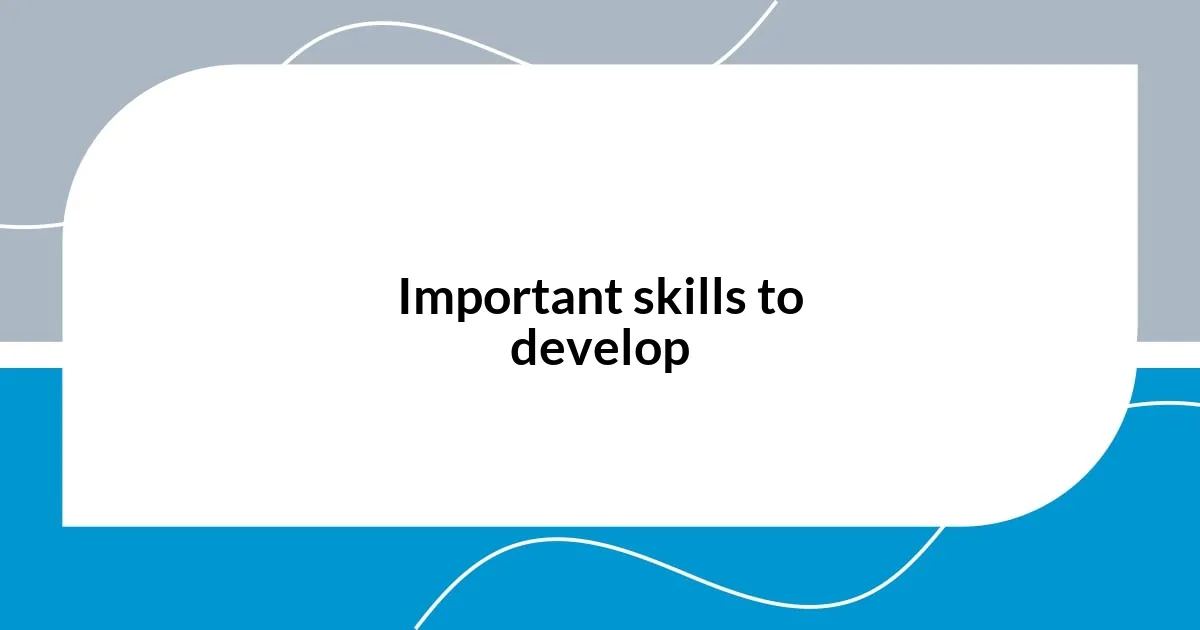
Important skills to develop
Learning to adapt quickly is an essential skill I wish I had developed sooner. I recall starting my first job and feeling lost in the daily grind. The atmosphere constantly shifted, and my inability to adjust left me overwhelmed. But over time, I learned that the ability to pivot and embrace change is invaluable. In today’s fast-paced world, those who adapt quickly often find themselves ahead. Have you ever found yourself clinging to the old ways when new opportunities beckoned?
Another skill that can’t be overlooked is effective communication. I remember vividly a project where I failed to express my ideas clearly to my team. The result? Conflicts and confusion that could have been easily avoided. As I navigated through those interactions, I realized the importance of being concise and considerate when sharing thoughts. Good communication fosters collaboration and creates a supportive environment. Wouldn’t you agree that a little clarity can work wonders in resolving misunderstandings?
Finally, critical thinking plays a significant role in decision-making. I learned this the hard way during a critical choice in my university days—following the crowd instead of analyzing my options led to regrets. Developing this skill has since empowered me to approach problems more thoughtfully. I now ask myself questions like, “What are the consequences?” and “What are my alternatives?” It’s a bit like taking a step back to see the bigger picture, don’t you think?
| Skill | Personal Experience |
|---|---|
| Adaptability | Struggled initially with job shifts, learned to embrace change. |
| Effective Communication | Failed to clearly express ideas, leading to conflicts. |
| Critical Thinking | Regretted following crowd, now analyze options carefully. |
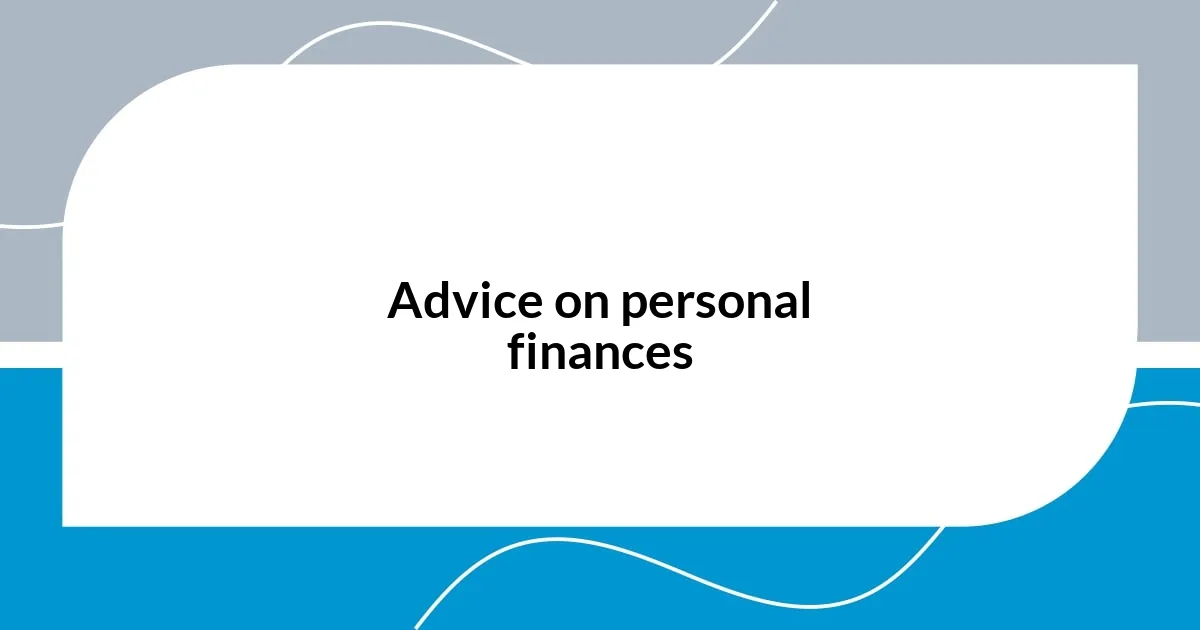
Advice on personal finances
Managing personal finances is a lesson I wish I had learned earlier in life. I clearly remember the excitement of my first paycheck; I spent it all on things that didn’t add value to my life, leaving me scrambling when unexpected expenses arose. Budgeting seemed tedious, but I eventually discovered how empowering it is to allocate my money purposefully. Watching my savings grow over time transformed my financial anxiety into confidence. It’s fascinating how a few simple changes can make such a profound difference in our financial health.
To help others navigate their own financial journeys, I’ve compiled some key pieces of advice:
- Create a budget: Tracking your income and expenses can reveal where your money truly goes.
- Start an emergency fund: Aim for three to six months’ worth of expenses to cushion against unforeseen circumstances.
- Invest early: The power of compound interest is remarkable; the earlier you start, the more your money grows over time.
- Educate yourself: Take the time to learn about financial literacy—the more you know, the better decisions you can make.
- Avoid lifestyle inflation: Resist the urge to upgrade your spending as your income increases; instead, prioritize saving and investing.
Remember, small, meaningful adjustments can lead to significant results in your financial wellbeing.
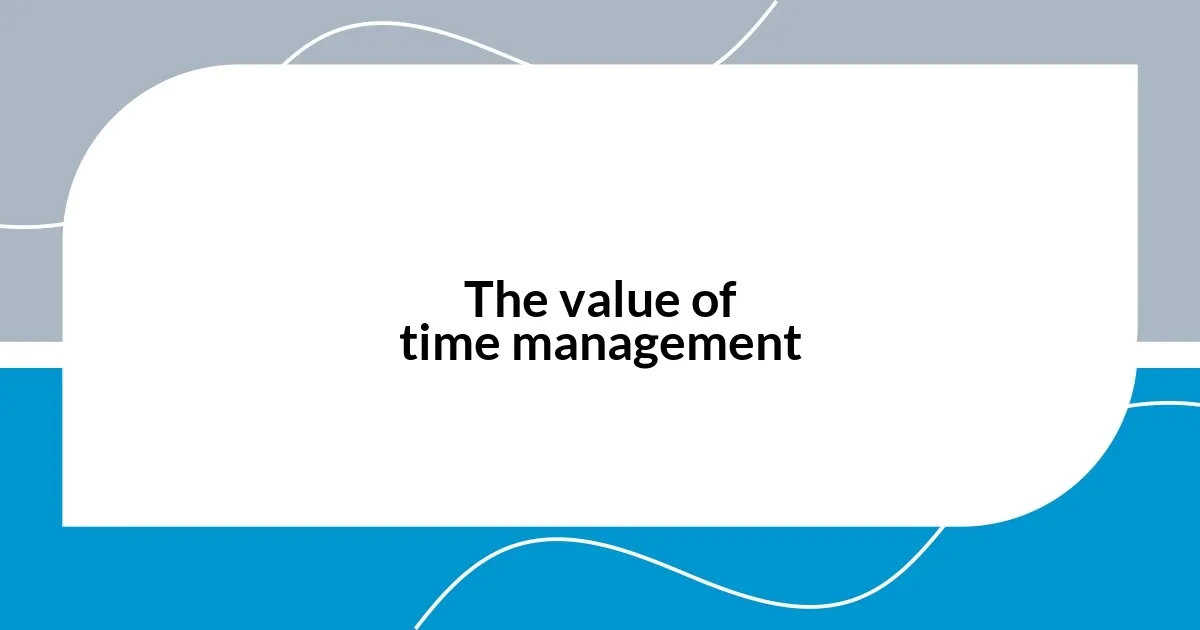
The value of time management
Time management is one of those skills that you don’t realize the significance of until you’re pressed for time. I remember sitting at my desk during finals week, surrounded by books with deadlines looming over me. It felt chaotic, and frustration set in. Now, I can’t stress enough how prioritizing tasks and setting a schedule can transform your stress levels. Isn’t it amazing how a little organization can lead to a more peaceful mindset?
Reflecting on my earliest work experiences, I learned the hard way that poor time management often led to missed opportunities. Once, I procrastinated on delivering a crucial report, thinking I had time to spare. That last-minute rush resulted in errors that could have been easily avoided had I managed my time better. Now, I often wonder—how many opportunities have I let slip away simply because I didn’t allocate my time wisely? It has prompted me to adopt techniques like the Pomodoro method, which allows me to work in focused bursts, making the most of every minute.
As I continue to embrace time management, I find it’s not just about productivity; it’s about enhancing my quality of life. Carving out hours for my passions rather than feeling perpetually behind has brought a sense of fulfillment. I sometimes reflect on how much time I wasted feeling overwhelmed instead of taking control. Have you experienced that same struggle? Knowing how to manage time effectively allows us to invest in what truly matters, whether that’s self-care, relationships, or personal growth.
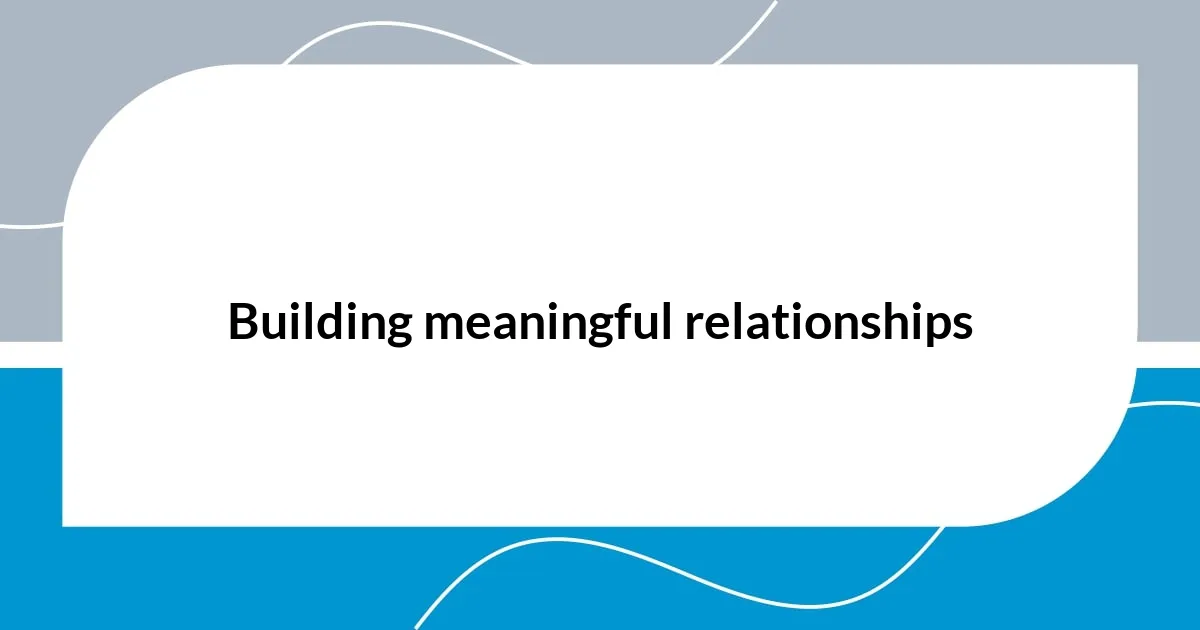
Building meaningful relationships
Building meaningful relationships has been one of life’s most significant lessons for me. I recall a time early in my career when I focused mostly on professional accomplishments and neglected my connections with others. There was a co-worker I used to overlook; we eventually bonded over shared interests, and that friendship not only made my workdays brighter but also led to incredible career opportunities. Isn’t it remarkable how investing time in people can open doors you didn’t know existed?
I often think about the importance of active listening in nurturing relationships. I remember a conversation with a friend who felt unheard amidst their challenges. Realizing I had been too focused on my own experiences made me truly appreciate the power of being present and empathetic. Have you ever paused to really listen to someone, setting aside your own agenda? That experience taught me that every meaningful dialogue strengthens the bond and fosters trust, which is essential for any lasting relationship.
As I reflect on my journey, I realize that vulnerability plays a huge role in building deeper connections. Sharing my struggles has not only helped me to forge tighter bonds but has also encouraged others to open up in return. I still vividly recall a heart-to-heart with a longtime friend where we both revealed our fears. It felt liberating to be transparent. Do you ever find that opening up creates a space for others to be genuine? Embracing this authenticity allows relationships to flourish in ways I never anticipated, reminding me that the most profound connections often emerge from our shared imperfections.
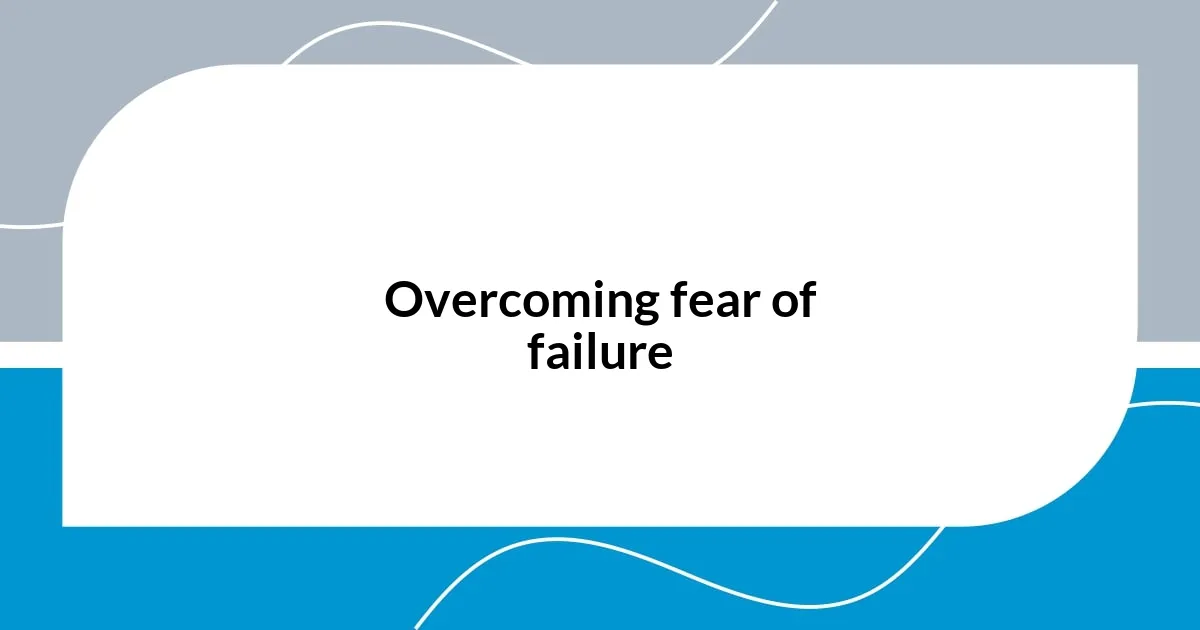
Overcoming fear of failure
Overcoming the fear of failure has always been a poignant journey for me. I vividly remember the day I hesitated to present my first major project at work. Anxiety wrapped around me like a thick fog. What if they didn’t like my ideas? That fear of judgment almost kept me silent, but I took a deep breath, stepped into the room, and presented anyway. The relief I felt afterward was monumental, leading me to realize that failing to try often hurts more than any potential critique. Isn’t it fascinating how facing our fears can lead to unexpected triumphs?
Every time I’ve taken a leap outside my comfort zone, I’ve encountered that nagging voice whispering doubts. I think back to when I decided to pursue a new hobby—painting, something I’d loved as a child but put aside as I focused on my career. My first strokes on the canvas felt clumsy, but that experience of creating something, however imperfect, was liberating. It taught me that every masterpiece begins as a mistake. Do you ever hold yourself back from trying something new because you’re afraid of the results? Embracing those little failures as part of the process can be a transformative mindset shift.
In moments when fear loomed large, I’ve found it immensely helpful to reframe my perspective. Instead of asking, “What if I fail?” I started to ponder, “What if I learn?” This simple change in mindset opened doors to growth. I remember a particularly challenging project where I stumbled several times before finding my footing. Each mistake was a lesson, each setback a stepping stone. Have you ever considered that failure might just be the best teacher? With every experience, I became a little bolder, ready to tackle the next challenge without the paralyzing fear that once held me back.
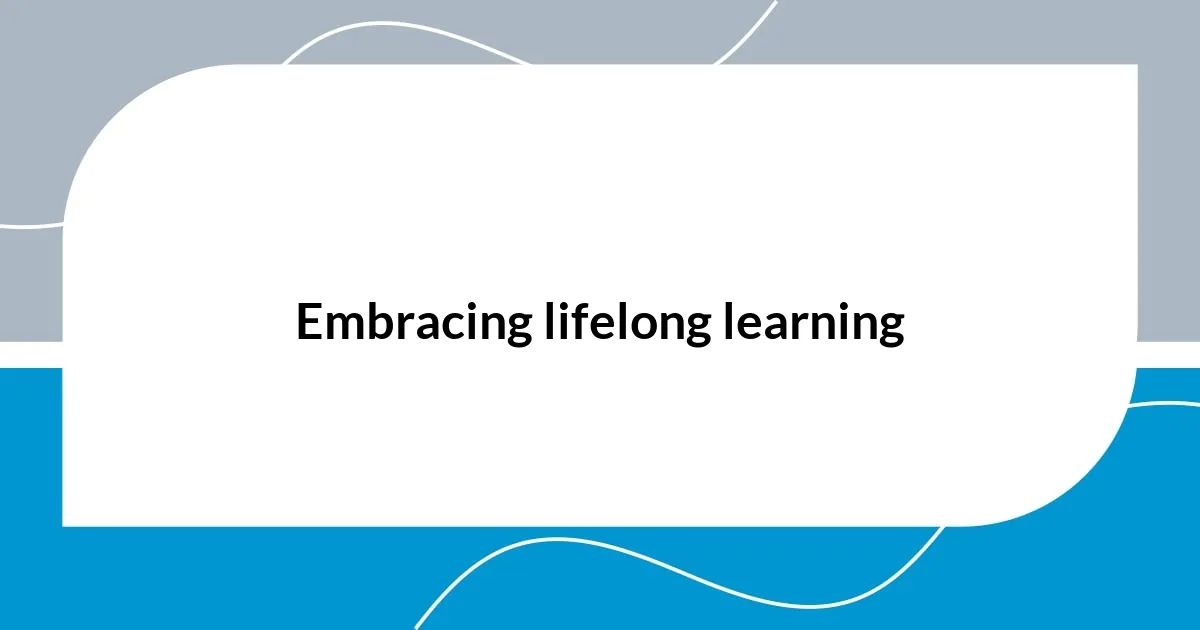
Embracing lifelong learning
Embracing lifelong learning has transformed my approach to both personal and professional growth. I vividly remember a workshop I attended years ago; it was outside my expertise, yet something drew me in. As I immersed myself in new concepts, I felt a rush of inspiration, reminding me how refreshing it is to step outside familiar boundaries. Have you ever experienced that exhilarating moment when you grasp something entirely new? That spark ignites a curiosity that propels us forward.
There have been countless times when I’ve underestimated the value of informal learning experiences. One memorable instance was when I volunteered to teach a small community class on a topic I loved. The joy of sharing my knowledge not only enriched my understanding but also deepened my connection with the students. Each question they posed challenged me to think critically and look at things from fresh perspectives. Isn’t it intriguing how teaching can be just as enlightening as learning? That experience reaffirmed my belief that every interaction holds the potential for growth.
Looking back, I realize that my greatest lessons often stemmed from unexpected situations. When I traveled to a different country, I found myself alone in a bustling market, struggling to communicate. Yet, the beauty was in learning the nuances of a different culture through observation and gestures. This experience taught me that learning often happens outside structured environments. Have you noticed how the world is constantly teaching us, if only we’re willing to embrace it? Embracing lifelong learning means remaining open to these moments, cultivating a mindset that seeks to absorb knowledge everywhere we go.